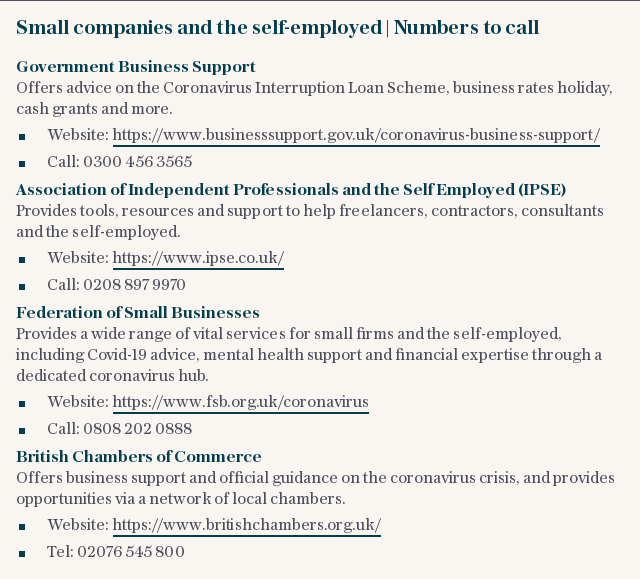What help the government has announced for the self-employed - and how to apply for support

Chancellor Rishi Sunak is expected to announce a rescue package for Britain’s five million self-employed workers imminently after accusations that this group have been left behind by the Government’s coronavirus planning.
What form this support will take and who may be exempt currently remains unclear. Here is what we know so far.
What could the rescue package look like?
Britain could follow the example of Denmark and Norway by promising to pay contractors a proportion of their income calculated using their earnings over the past few years. In Norway, self-employed people have been guaranteed 80pc of their usual monthly incomes, based on several years of tax returns.
Alternatively it could adopt a French-style model and offer a flat payment for anyone whose earnings drop by more than 70pc; or it could take an entirely different approach.
What’s causing the hold-up?
Mr Sunak has said the delay is down to the extra complexity involved in working out how to create a fair system for the self-employed. It is likely that any resolution will have exemptions to avoid putting large payouts into the pockets of wealthy contractors.
Those who have only recently become their own boss have raised concerns that a compensation scheme based on recent earnings could disadvantage them if they are only just starting to build up their business and income.

What is available at the moment?
Benefits
Currently freelancers and contractors whose work dries up because of coronavirus will be eligible for benefits paid through Universal Credit at the same rate as statutory sick pay (£94.25 a week). That means the average self-employed person would be having to survive on just a quarter of their typical income, official figures show.
By contrast, PAYE employees in the same scenario will continue to receive their salary (up to a maximum of 80pc) if their employer applies for support under the Coronavirus Job Retention Scheme. With this, the Government will pay the wages of staff who are put on unpaid leave up to a maximum of £2,500 a month – just above the median income.
If employers want to top up pay levels, they can, but will not be able to claim for more than 80pc of £3,125, equivalent to a gross monthly salary of £2,500.
The Universal Credit standard allowance and working tax credit basic element will both be increased by £1,000 for the next 12 months to support those on low incomes.
Mortgage relief
The Government announced that all homeowners will be able to claim a three-month break from their mortgage repayments if they are unable to pay because of coronavirus.
It has also stated that no tenants can be evicted from their home during the crisis.
In addition, renters will benefit from increases to housing benefit and the housing element of Universal Credit, so that the Local Housing Allowance will cover at least 30pc of the market rents in each area, according to consumer group Which?.
Tax returns
Self-employed people are also able to delay payments for their self-assessment tax return, due in July, until January 2021.
Grants for small businesses
Those who have set themselves up as a business may benefit from some of the other measures introduced by the Government to minimise the economic impact of coronavirus. These include cash injections of £10,000 for Britain’s smallest businesses, relief from having to pay business rates and the opportunity to apply for loans.

How are the current measures lacking?
Self-employed workers face a dramatic loss of income, if forced to take time off for sickness or quarantine.
Chancellor Rishi Sunak told MPs it is “incredibly complicated” to design a system to support the self-employed but insisted that intensive work is going on in Whitehall.
Those relying on Universal Credit face waiting up to five weeks for their first payment because of the time taken to process new applications.
‘The difference in treatment between employees and the self-employed is completely unjust’
Within just a few five-minute phone calls, freelance musician Ed Barker, 35, lost thousands of pounds’ worth of work and saw his diary wiped clean for the foreseeable future.
Mr Barker, a former sax soloist for George Michael, is concerned about how he and many others within his industry will continue paying the bills now that his income has fallen by more than 80pc.
“The difference in treatment is completely unjust,” said Mr Barker. “The Government was quick to announce huge payouts for employees but we have been left waiting much longer for a resolution and lots of people are struggling mentally not knowing if they’ll receive any help.”
Mr Barker said that one of his musician friends lost £12,000 of work in one phone call.

In an attempt to help others within his industry he wrote an open letter to the Chancellor urging him to help the self-employed. The letter has been signed by more than 2,000 musicians including members of the Royal Philharmonic Orchestra and the Ronnie Scott’s Blues Band.
“It’s not just performers who have been affected by technicians, marketing staff and so many others. Many of them have families to feed and mortgages to pay,” Mr Barker said.
“The self-employed are the brave ones going out and making opportunities: it’s only right that the Government should support them,” he added.

 Yahoo Finance
Yahoo Finance 